Dear reader … it’s been much longer than planned since I published my first and only newsletter on Substack.
Privately, I hoped to publish my newsletter on a monthly cadence, but shortly after my January letter went live, I found myself destabilized in an all too familiar way. I developed an ambiguous and distracting injury in my foot and ankle while training for a half marathon. The following is an amalgamation of thoughts and reflections I’ve had in the weeks since.
Brownie points for those of you who make it to the end.
xx C
They say nothing prepares you for the grief that accompanies retiring from your sport after college. I do not doubt this, though I do not know for certain.
What I do know for certain is, nothing, and I mean nothing, prepares you for the self-loathing and heartache that comes with medical disqualification.
Only 5% of all college students across Divisions 1, 2, and 3, are student athletes. Less than 2% of college athletes go on to play their sport professionally. One minute you are eleven years old, playing your sport for the love of it, and the next, you are 22 and it is your last game or race of your athletic career.
Or, if you are like me, you are 20 years old, sitting on an elevated medical table with forest green leather upholstery, enveloped by a semi-circle of medical professionals, telling you it’s time to be put out to pasture.
I was thirteen when my mother signed me up for an introduction to rowing camp. I was devastated. I’d been playing field hockey (rather badly) for two years but had a propensity for rolling my ankle. After the second or third iteration of the injury, upon the recommendation of a dimwitted orthopedist, I was advised to “never run again.” (Who tells a thirteen-year-old to never run again?) Don’t get me wrong. At this stage of my life, I hated running. I could think of almost nothing better than having doctor’s orders ensuring I would never run a timed mile test again. Perhaps I could get out of gym also? Even organized sports altogether?
My mother had other ideas. I had to move my body, she said. So off to introduction to rowing I went, crying all the way in the car.
I’ll be bad at it. I was certain. And in classic oldest child fashion, there was no use in doing anything if I was not going to be the best. Or at least very good.
I remember my mother being there the entire session, but I’m not sure if that’s right. I remember being shown how to use an erg (an indoor rowing machine), and the coach laughing and telling me to relax when I started wrenching the handle. I noticed the harder I pulled the handle, the happier he seemed. Pull hard, go fast, get praise. I had cracked the code to an impossible equation.
Sometimes I wonder if I ever loved rowing, or if it was the validation I loved more.
Earlier this week my therapist said, you did not feel seen as a child.
Rowing made me feel seen.
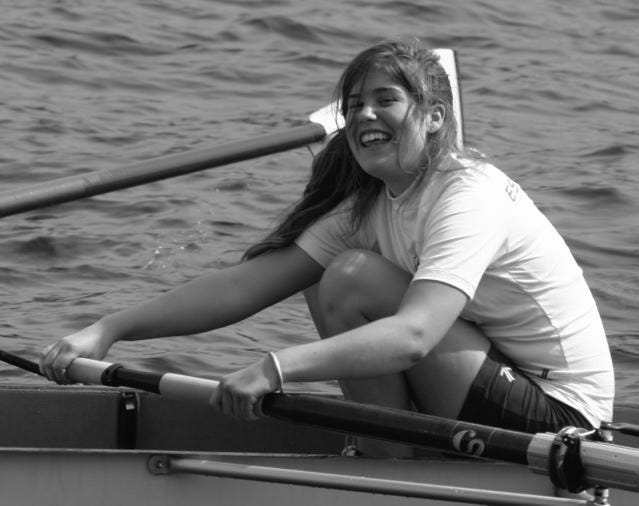
It wasn’t long before my coach was talking to my mother about the possibilities of junior nationals and college scholarships. Prior to rowing, the phrase “natural ability” was one I’d only ever heard from my English teachers. And having an aptitude for reading wasn’t going to make up for my other academic failures or social shortcomings.
But a natural ability when it came to rowing? This earned me respect. Praise from adults. Pride from my parents. And eventually, a college scholarship.
The summer before I arrived at Michigan State, I became fixated on becoming a national team athlete. I was part of an elite summer program and failed to place at Nationals by mere seconds. The fuck up was mine and I pitched an absolute fit. I decided my life could have no more distractions. All my free time would be dedicated to the practice of rowing. I was not going to date. Not that anyone was interested. Nonetheless I crossed this off my list of things to worry about. I could worry about love later. And if that meant I’d never have children, that was ok too. Because nothing was more important than hyper focusing on my passion to ensure my excellence, because again, what was the point if I was not the best.
Simultaneously, I was battling an ambiguous and distracting injury.
It began my sophomore year of high school. I first noticed my right hand fatiguing after hand-writing or brushing my teeth. Then I began taking my right hand off the oar to shake it out, spreading my fingers as wide as I could to release the cramping sensation. Later, a dull ache emerged in my wrist, elbow, and curve of my neck. And a burning spread underneath my shoulder blade.
Conveniently, I developed enough lung infections over the course of my high school career that I was constantly being forced to take breaks, sometimes for weeks at a time, during the winter season. This was always the hardest season for me. The erg handle was more narrow and slippery compared to the oar, and my mysterious condition fared much worse under those circumstances.
I saw every type of specialist over the course of four years. One confidently diagnosed me with a tear in my shoulder, despite imaging being negative. He’d wanted to do an exploratory surgery. No thanks, I wanted to say. One older attending with white hair and a round belly placed his hand on my shoulder and asked me if it was possible I was stressed. Of course I was stressed. My life’s goal was to be the very best, and my condition was calling into question the reality of my dreams.
Four years later, at the end of my freshman year of college, I was diagnosed with neurogenic and ventricle Thoracic Outlet Syndrome, a condition that leaves you with a quality of life comparable to chronic heart failure.
After two surgeries – one, an unquestionable failure – my coach and my doctors presented me with the medical disqualification paperwork. I would keep my scholarship on the condition that I remained an active participant in the rowing program and athletic department. I would assist at practices and swipe IDs at the student-athlete academic center. I understood why this was necessary. I had to earn my keep. But it is a very specific type of torture to lose the love of your life and then watch, day in and day out, as someone else lives out your love story.
I remember the first 2k time trial I sat out as an official medical DQ.
For non-rowers, 2k’s are timed trials on the rowing machine to see how fast you can race 2000 meters. These tests are crucial to determining which boat you’ll be in on race day. 2000 meters is a torturous racing distance – too long to be considered a sprint, not long enough to be considered a distance race. I once heard that the energy required for a 2k is comparable to that required to play 11 consecutive basketball games. Whether or not this is true, I have no idea. What I can tell you is, if your brain isn’t telling you to quit by 500 meters in, you are not working hard enough.
I can still hear the keypad beeping and the click of the lock on the door to the Michigan State erg room at Jenison Field House. Upon entry, I am met with the woosh of the ergs, the rhythm of my teammates warming up in unison, the injured girls hunched over spin bikes – their desperation to prove their worthiness apparent in the sweat already beading off their shoulders and brows. Someone is asking an assistant coach to swap the playlist from country to hip hop. Someone else is animatedly disagreeing. My sister is at the far end of the room looking unphased, ready for her test, unnervingly relaxed. The other girls do not like this, and that makes me proud. I know when it is all over, she will outperform most of them – girls two to three years her senior. If I’d been on the floor, she would have outperformed me, and I’d have still been proud.
My intention had been to stay. But as soon as Coach Matt signaled for the girls to begin their tests, I rushed toward the door and cried in the hallway. This routine continued for the remainder of my time at Michigan State. I cried everywhere. In hallways. Coaches’ offices. My athletic-academic advisor, Jeremy’s office, who, God bless him, was woefully unqualified to provide the kind of support I required. I cried outside the erg room. In the weight room – which only made the weight coach hate me more than he already did. I have no real proof he hated me, aside from the looks of annoyance I perceived from him. Mostly I cried in the training room, while the Athletic Trainers helped me with my physical therapy.
When actual tears weren’t falling from my face, I looked like a sad cartoon character. Glassy, wide eyes. Small, downturned mouth.
The shame and embarrassment of my massively public failure ate me alive. Anyone who knew me knew I’d dreamed of being a national team athlete. An Olympian even. Rowing was the only dream I’d dreamed so publicly. It was the only dream I’d let myself believe, because I’d been assured by outside observers that I was going places.
The same summer I did not place at Nationals, my best friend and I won the Independence Day Regatta. I remember the recognition in the dock master’s face as she placed the medal around my neck and said with confidence, she knew who we were and was excited to see what we did next.
After that summer, I never raced again. The investment Michigan State made in me had been a mistake. I failed them. Or maybe I tricked them. Maybe I made them believe I was something I was not – talented. They were paying me tens of thousands of dollars in tuition money and providing free medical care. In return, I cried through practices and quietly convinced myself I was a master manipulator who never belonged there in the first place.
They say time heals all wounds, but I disagree. Time creates distance and distance gives way to endurance. And eventually, the thing you once held so closely to the surface, the thing that at one time could have knocked the wind from you, becomes a pace you can hold forever.
In 2017 I took up running, after years of searching for ways to prove to my chronically in-pain, forever-injured, former-athlete self I was still capable of hard things. And better yet, I did not need my arms to run. Yes, technically, your arms serve a purpose in running, but they are not essential in the way they are for rowing. On the eve of my 27th birthday, I did just this: completing a half-marathon after 16 weeks of steady training. I was not fast. I had not expected to be. The mere fact that I had consistently trained for and completed the race was enough. This was the first time I had raced without a time in mind. I just wanted to finish, and I did.
This was around the same time my boyfriend, now husband, Harrison, had reached out to Concept2 (a brand that makes rowing machines) asking if they had ever thought about how to make an adaptive rowing machine for people who could not use their arms. To my surprise, they responded. They thanked him for his note and regretted to inform him that this was not something they had figured out yet. This answer seemed obvious to me, but the fact that he was asking this question solidified my instinct that I was going to marry him.
Running, like rowing, satisfied my desperation for excellence. For a time, my favorite quote was “we are what we repeatedly do. Therefore, excellence is not an act, but a habit.” Running is habitual. You must show up day after day, no matter the weather, regardless of whether your run the day before sucked. You must show up and you must put one foot in front of the other. I would never, will never, be excellent on the world stage of running. But in my own life, in the life of the girl who “should never run again,” the girl whose body felt as though it was constantly on fire, I could be excellent. I could show up for myself day after day; again, and again.
Fast-forward to September 2023. Harrison, and I had been noodling on whether it was time for us to start a family. Our jobs were stable. Our finances healthier. Our relationship stronger than ever. We’d welcomed two nephews into our family earlier that year, filling our summer with the kind of joy only a tiny human could inspire. Maybe it was time we joined the ranks of parents.
And then, I found myself on “runtok” – a corner of the internet where runners share their love of the sport – and I was reminded that I had not yet run a marathon. When would I have time to run, let alone a marathon after I had a child?
I imagine a panel of mothers assessing my question. Half are nodding in agreement. “How can you give your child everything they deserve if you are worried about running?” The other half shake their heads. “No, you fool. Do you want to lose yourself and wake up 18 years later (or let’s be honest in today’s day and age, 30 years later) to an empty house, with no idea who you are?”
“I want to run a marathon this year,” I told Harrison. A baby would have to wait.
As part of my base-building efforts, I would first train for and race another half marathon. Start small, see how things go, try not to get over excited, and eventually select a marathon to run in fall of 2024.
Enter a new ambiguous and distracting injury.
On a damp January afternoon, warming up along the Charles River Esplanade, I noticed a slight soreness in the joint of my pinky toe. I paused, did a few quick stretches, and focused on my foot placement for the rest of my run. For two weeks, that soreness proliferated into an all-consuming burning sensation on the padding of my foot that eventually swallowed my entire foot and ankle in a constant state of numbness, aching, and burning.
As I am sure you have all caught on by now, numbness, aching, and burning are hallmarks of Thoracic Outlet Syndrome. Anatomically speaking, it is impossible to have Thoracic Outlet Syndrome in your lower extremities.
Though I knew with absolute certainty that I did not have Thoracic Outlet Syndrome in my left foot, this fact did not stop my imagination from running wild. My grandfather died of ALS. Numbness in your feet and hands are early signs of ALS. I am notoriously clumsy, and I had tripped an uncharacteristic number of times during my runs in the last two weeks. Before my grandfather received his diagnosis, he bought several new pairs of shoes, convinced each new pair would be the answer to his troubles. I had just bought several new pairs of running shoes, convinced they would solve my foot pain.
My body was failing me once again.
Every ounce of emotional endurance I had built up in the years following my medical disqualification ceased to exist. I was again, 20 years old, sitting on that medical table with green leather upholstery, surrounded by short men with beards and medical degrees, telling me my athletic career was over.
I had disengaged from reality.
The truth was, the world’s nicest woman, a PA from my doctor’s office – who told me to hold space for my emotions and that it was going to be ok – said I might have a stress fracture and I needed to rest. Several weeks, two x-rays, and three MRIs later, she was right about one thing. I needed to rest. I on the other hand, was wrong about a lot. There was no need for me to stop running altogether. My body was not failing me. In fact, my body was doing exactly what it was supposed to do. It was alerting me that I was putting too much stress on my body too quickly. I needed to slow down.
If you’ve ever experienced a loss, you know that grief comes in waves. There was a time when I’d run past a cluster of boats on the Charles, and the air would catch inside my chest and my nose would burn. It’s taken me a long time to realize it might not be rowing that I am grieving. I might be grieving the loss of my body functioning the way bodies are supposed to function. I might not actually be grieving at all. I might just be really fucking angry.
For so long I pushed my body beyond what it was ready for. Every time I had to ask someone to slow down because I could not keep up; or help me open a jar because my hand was not strong enough; or drive the car because my hand and arm felt like lead; or pass on a night with friends because being in constant pain depleted me of every drop of energy I had, I felt full of self-hatred. Why had this happened to me? Why could I not fix it? My body was perpetually tense, a knot forever swirling under my sternum.
Running had never been about pushing myself beyond my limits. Sure, it started as a reminder to myself that I could do hard things. But, because I wasn’t trying to win medals and gain outside validation, running kind of became a metaphor for my life. I was constantly uncomfortable and yet, each morning I woke up and greeted the day. Running connected my mind with my body, and my body with nature. It alerted my consciousness to my truest thoughts and feelings. It was about showing up, and doing the boring thing, or the hard thing, again and again, and finding the joy in the practice.
Self-loathing is sneaky. I had forgotten its stealth nature and the fear it feeds upon. Thinking about starting a family had filled me with apprehension. In the burning fiery hellscape that we live in, becoming a parent does seem to have its drawbacks. Motherhood in particular seems to be a losing battle accompanied by mountains of social and cultural pressure. Of course, on the other hand, parenthood, motherhood especially, appears to be a rewarding labor of love. With big bright spots of joy. But how can you really know if you are ready when there is nothing that can truly prepare you for it.
Suddenly, I was racing against time. Against myself. If I didn’t run a marathon this year, I never would. A new life would start as soon as I embraced motherhood, and the things I am and the things I love would be left behind in my former life. When the injury in my foot and ankle emerged, all I could think was that I did not have enough time. Yet again, my body was not doing what I needed it to.
As I write this, I still don’t totally understand what caused my foot and ankle pain. The pain is gone now and I am back to running. If you had told me at 20 that the trauma of being medically disqualified from my sport would rear its ugly head in my internal battle with myself to have children, I would have laughed and rolled my eyes. There is still much I am trying to understand about the intersection of the expectations I have of myself and my body, and the beliefs I have about life pre and post children. What I do know for certain, is moms run marathons all the time, a body in pain is a body doing its job, and all we have is time. And I am tired of spending my time, however long that may be, being angry at my body for not meeting my expectations, and afraid it won’t achieve the things I think it ought to.




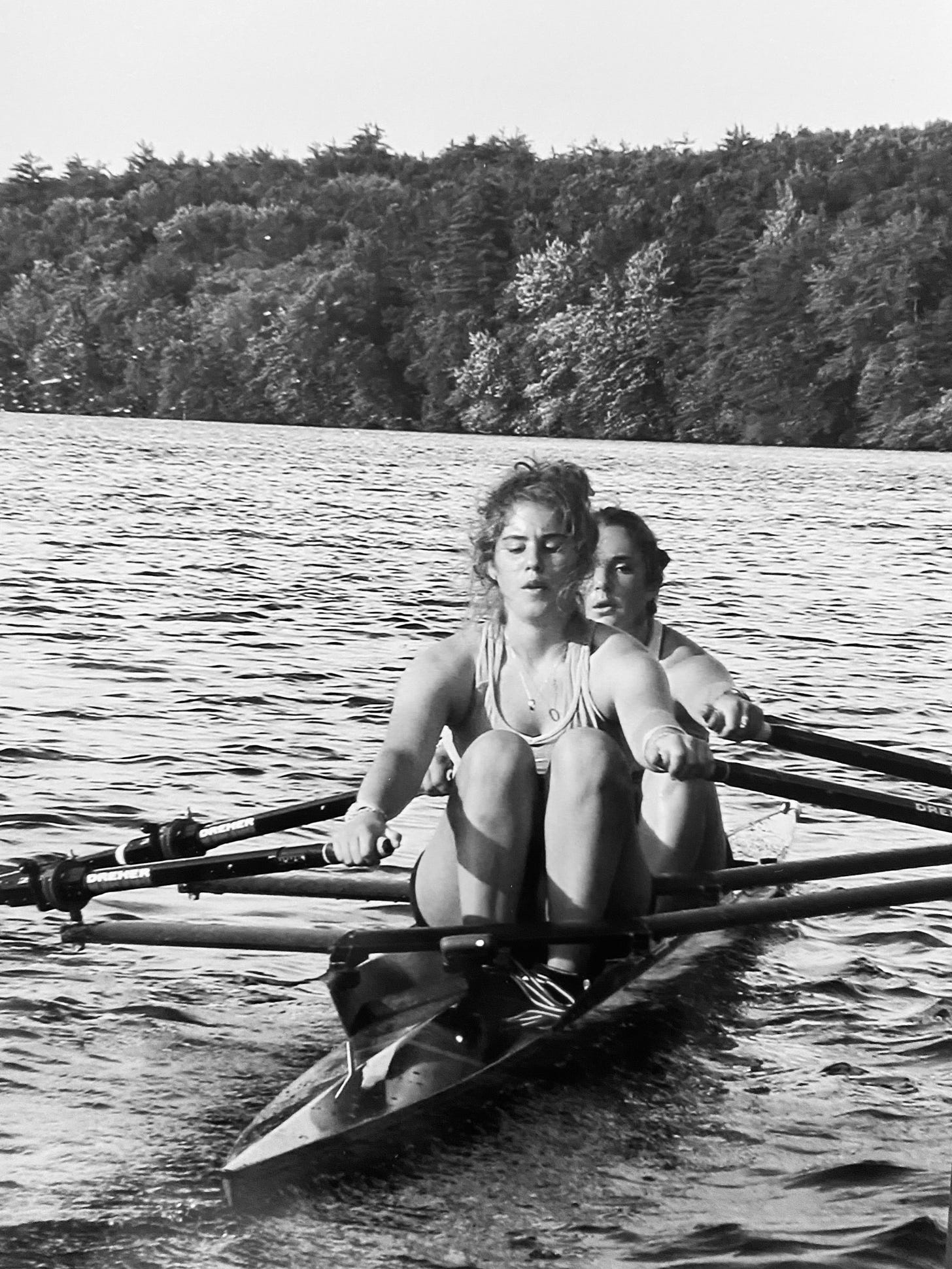
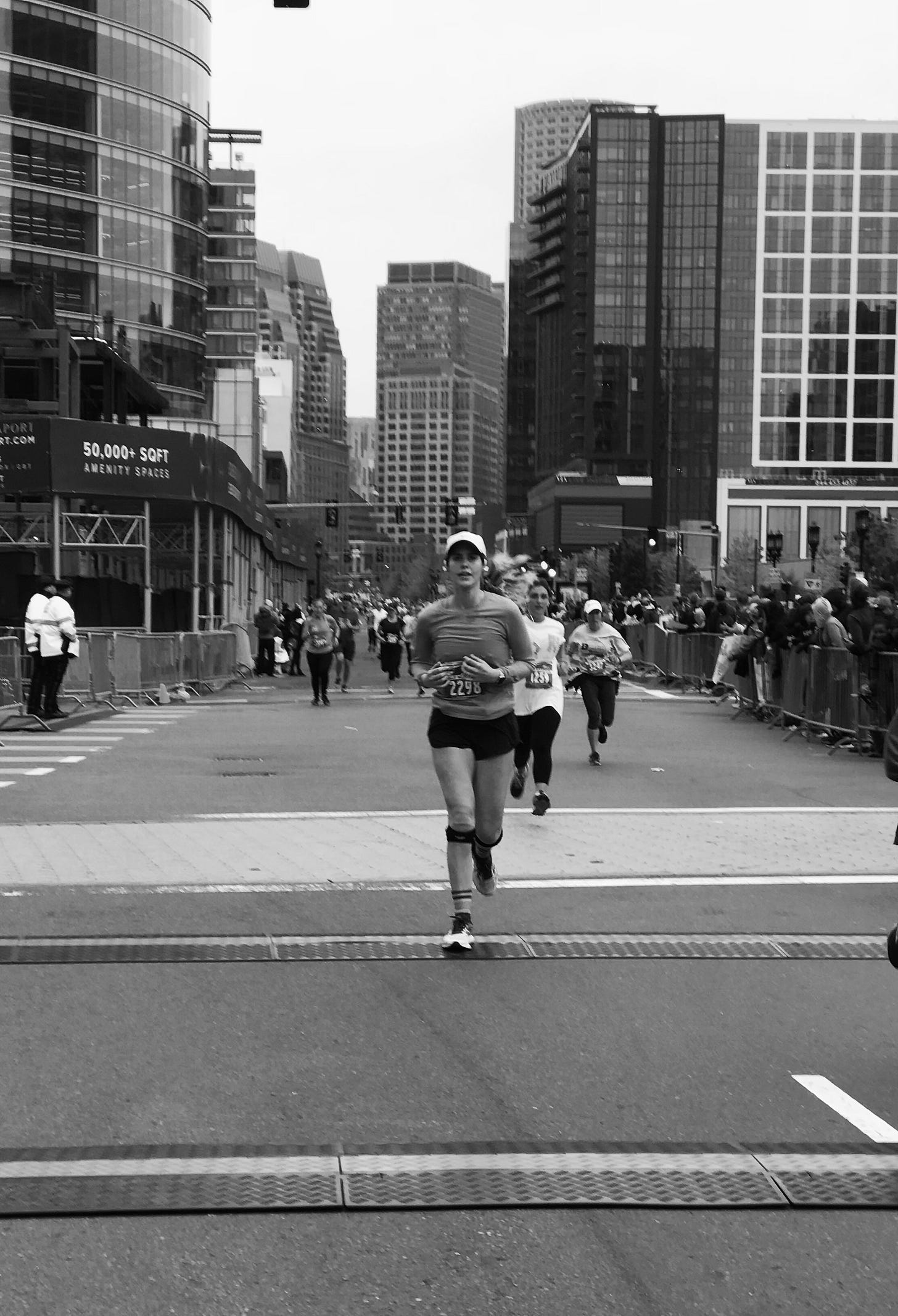
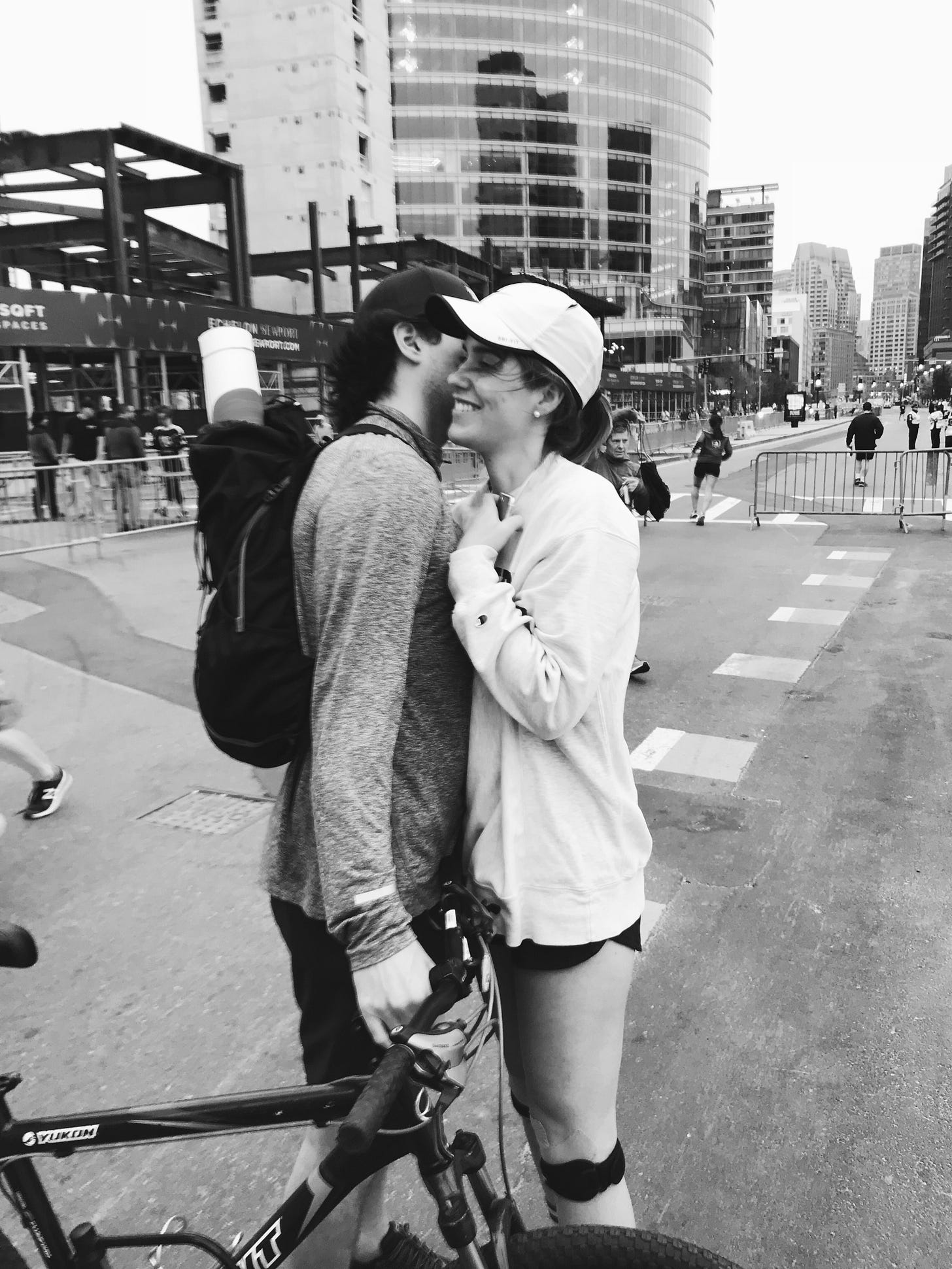

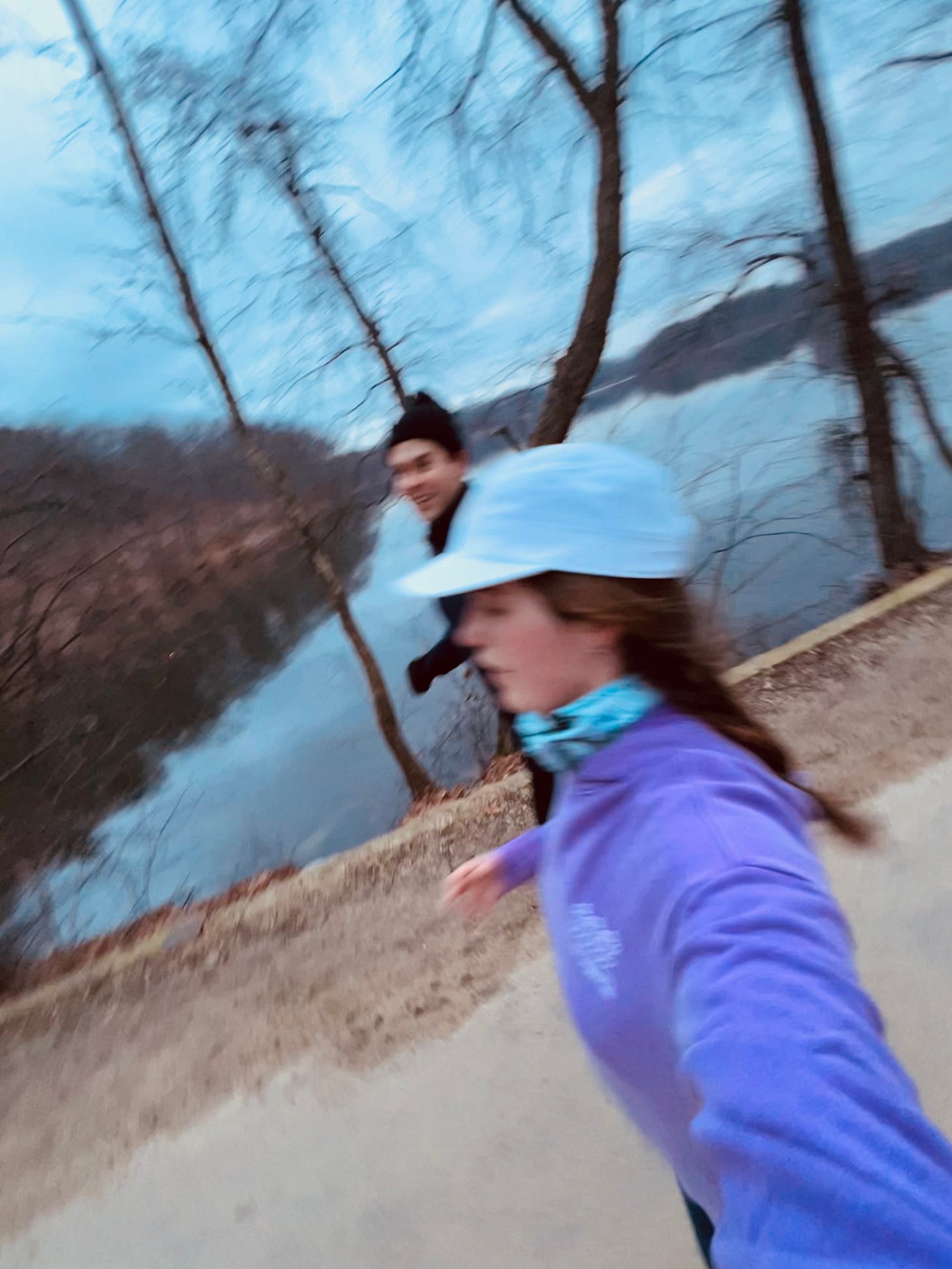
Speechless! I could read 80,000 words of this story. Please, more. Thank you.
This is beautiful, Cate - brava!